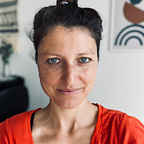A “Luxury Migrant” in Helsinki
Now that you know how I landed in Finland without having planned it at all (if you don’t, read the full story here), you might be wondering what I have been doing there and why I am still living in Helsinki. Well, as my first interest in this Nordic country was its weird language, I started by taking a Finnish class. And it turned out to be one of the most transformative experiences in my life, besides being confronted by an idiom that has been resisting my efforts much more than I expected (yes, I have to admit, my ego of a so-called languages talent has still not completely recovered from it).
A “luxury migrant”
Attending a suomen kurssi (aka “Finnish course”) has introduced me to what it means to be a migrant. At first, I was not very clear about my own status in Finland: was I actually a tourist, an expat, a migrant, some kind of refugee? After a few months, I concluded that I was in the very broad category of “migrants”, not only because of my personal situation but also because of the people I got to know. I started considering myself as a “luxury migrant”, as well as, to some extent, a kind of refugee. With my beautiful white and red passport, my educational background and my very limited savings in Swiss francs, I was falling into the easy-to-welcome-foreigner group: it took me only two weeks to get the highly sought-after residency permit that many of my friends are still struggling to be granted, their life depending on it.
Hidden reasons
I also soon came to understand that other reasons for leaving my homeland were lying behind the obvious rationales for moving to Finland. For sure, I wanted to take a break from my job as a paramedic, live abroad for a while and learn a non-Indo-European language. But my life in Helsinki offered time and space for deeper motives to come to the surface. I had not been aware of how unsafe I had been feeling in the environment I grew up in. Hearing the stories of my friends who were officially labelled as “refugee” was throwing me back to my own experience of violence and abuse and I realised that, unconsciously, my mind had given itself the means to deal with those personal issues by leading me to the north of Europe.
A new meaning
Reading about something versus being directly exposed to it usually generates completely different experiences. “Migration” is now, for me, a word that lives in names, faces and stories. I have had the privilege to share the joy and intense relief of a friend receiving his oleskelulupa (the magic Finnish word for “residence permit”) and the efforts of another one going once again through her studies as a means to confirm the skills acquired back home, while I call every week a third one who decided to try his chance crossing from Dunkerque to the UK — still stuck on the French coast as I write — after being denied the right to stay in Finland. No pain and no joy can be compared, they all differ in their intensity and in what we make out of them, but I definitely regard myself as favoured without having done anything special to deserve it.
Vacuum cleaners don’t speak Finnish
Nonetheless, I had to go through one of the most common career paths for migrants in many countries of this world: doing a job that the locals tend to avoid and that doesn’t require any specific education or knowledge of a foreign tongue, namely cleaning. In many aspects, the work of a cleaner is similar to that of a paramedic: rescue units spend a lot of time decontaminating their equipment, ambulance and premises, they enter unknown homes and they face all kinds of more or less dirty stuff every day. Hence, I felt at ease in the job. But I was also frustrated because vacuum cleaners don’t make the best conversational partners, which left me in a position of not being able to practice my Finnish, nor make the most out of my qualifications. After a while, I decided to quit and see what would happen next. By that time my language skills had improved a little (no thanks to the vacuum cleaners) and, with the help of a friend, I got the opportunity to work as a waitress in an Italian restaurant. There, I met one of the best bosses I have ever had and I enjoyed practising all the idioms I know with the customers.
Should I stay or should I go?
Another six months later, I got offered a position abroad and I chose to go. For various reasons that would be too long to explain here, I finally turned down the job and found myself registering again as a (not so) newcomer to Finland without having ever left the country. Once again, a friend provided me with a solution, mentioning The Shortcut over a cup of coffee. I remembered having already read something about this talent accelerator located at the heart of Helsinki’s startup ecosystem. I went back home and I applied for their Catalyst Program just in time as it was the last day to do so — and here I am, having gone in a few weeks from the status of participant to that of content creation intern in the very same organisation.
Helsinki means friendship in Finnish
From places to stay to places to work, my life in Helsinki has been shaped and supported by the wonderful people I have met here, foreigners and Finns alike. I feel honoured by the time they share with me and I am looking forward to seeing our friendship grow, no matter where we may live in the future.
I thank my dear friend Renske Visser for her precious advice on this text.
